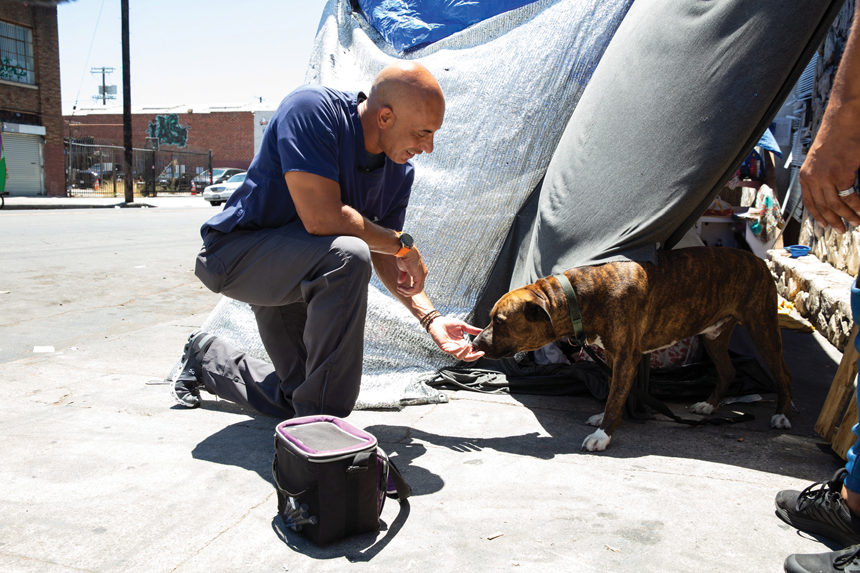The homeless man sat outside of a 7-Eleven in San Diego. Kwane Stewart had walked by him before, ignoring him, as so many of us do, but this day was different. Stewart, a veterinarian at a nearby animal shelter, was struggling. He was burned out and thinking about quitting his job. It was 2011, and in a lingering recession, the shelter was full — too full — as desperate people increasingly gave up their pets. If animals weren’t adopted after seven days, they were euthanized. On some mornings, Stewart says, he and his colleagues euthanized 50-60 animals by 10 a.m.
“I felt like I couldn’t go into work,” he says of that day at the 7-Eleven. “And I turned and saw that this homeless man had a dog. I don’t know that I had noticed the dog before, but I saw the dog that day. I introduced myself and said, ‘It looks like your dog has a skin issue.’ And he said, ‘Yes, she’s been suffering for months. I don’t know what it is. She’s miserable; she scratches and whines.’ He looked completely hopeless.”
Stewart diagnosed a flea condition and promised to bring a remedy the next day. Roughly 10 days later, when he encountered the man at the same 7-Eleven, the dog’s hair was returning and she was wagging her tail.
“He looked up at me with tears in his eyes and he said, ‘Thank you. Thank you for not ignoring me,’” Stewart says. “And that was the moment for me. I said, ‘I’m gonna get back to saving and helping animals on my terms.’”
After that day, Stewart began working in his off hours as a street vet. Over a nine-year period, he provided pro-bono care for over 1,000 homeless people and their pets. In 2020, he formalized the operation, creating a nonprofit called Project Street Vet. The organization works primarily in San Diego and Los Angeles and has also provided services in San Francisco. Anywhere from 10 to 25 percent of the nation’s homeless population have a pet, and Project Street Vet provides education and free services such as exams, vaccines, flea medications, and supplies.
“The best part to me is the one-on-one interaction,” Stewart says. “I’ve sat for 90 minutes in an alleyway next to a dumpster getting to know this person, and I can tell, when I walk away, their faith in humanity has been restored a bit. They feel gratitude that someone showed up with no agenda, just wanting to help their pet, which is the most precious thing they have. And it keeps them going.”
Stewart’s own love of animals began when he was a boy in New Mexico. “My mom had lots of animals, always, and because of her we had dogs and cats and chickens, and in high school, she got a couple of horses,” he says. At age 7, after seeing the movie The Black Stallion, Stewart told his mom, “I want to be an animal doctor.” In 1997, he graduated with a veterinary degree from Colorado State University, then packed up his old Mustang and moved to San Diego.
Stewart loves being a vet, but the job can be stressful.
“I would say shelter work and emergency work are the hardest, and these are the two things I did most of my first 10 years,” he says. “Dealing with euthanasia and difficult clients and having animals die that you’ve invested a lot into — it’s hard. By and large, veterinarians are sensitive, emotional people. I think that’s why we gravitate toward the profession. We have this love for innocent creatures, wanting to heal them and fix them.”
After his encounter with the homeless man at the 7-Eleven, he conducted his street vet work in secret, never telling his family or friends.
“I didn’t even tell my live-in girlfriend at the time,” he says. “Doing that work, it was healing for me. I wasn’t trying to get attention. It was just my little private, secret crusade.”
He financed the work himself, but it became expensive. Some animals needed costly procedures, from tumor removal to dental work. Stewart would ask fellow vets to reduce their costs or do pro-bono work. Some would, some wouldn’t. He paid out of pocket for procedures costing anywhere from $5,000 to $8,000, while still paying $1,000 a month for his student loan debt.
“Eighty percent of what I do on the streets I can treat out of my little bag — it’s preventive care, vaccines, flea and tick prevention, heartworm prevention, toenail trims,” he says. “Ear infections and allergies are common in California — I can treat those with an injection or some pills. It’s the other 20 percent that became expensive. But it was hard to tell someone, ‘No, I can’t do that.’”
A career shift — and some serendipity — changed everything. In 2013, Stewart became chief veterinary officer for American Humane and national director of its No Animals Were Harmed program, which certifies that movie and TV productions meet its standards for the safe treatment of animals.
“It is the coolest job — and I still do it today,” says Stewart, who has worked with Hollywood bigwigs such as Steven Spielberg and Brad Pitt.
One day in 2016, during an on-set delay in filming, a producer asked him, “What do you like to do?” For the first time, Stewart revealed his street work and shared stories of his homeless clients.
“He’s like, ‘That’s a reality show if I’ve ever heard one,’” Stewart recalls. That led to a 12-episode docuseries in 2019 called The Street Vet (available on Roku), which provided new exposure for his work — and eliminated his funding problems.
“I went from doing this in the shadows to having a show about me that’s in 30 countries, and it just kind of steamrolled from there,” he says. A GoFundMe campaign launched that same year has passed $250,000 in donations. “Before, I would have to turn people away; now it’s rare, if ever, that I have to say no. And it’s just growing and growing.”
Stewart’s “grand vision” is to start a street vet program in every major city. These days he spends more time organizing clinics, which allows him to see 20-30 pets in two hours, than working on the streets, but he still hits the pavement once or twice a week. The work isn’t easy, notes fellow volunteer and registered vet technician Genesis Rendon, often involving hot and dirty 12-hour shifts.
“What I love about him is that he’s one with these people: If they’re sitting on the floor, we’re sitting on the floor — he’ll go inside their tents,” she says. “There’s no judgment, ever, from him. And that’s why I enjoy working with him. Because it’s all coming from the heart.”
Stewart has written a book that will debut in 2023 (think of him as an urban James Herriot) and tell the stories of his homeless clients, such as Justin, who had rescued his cat Um from a dumpster when she was a kitten. When Um got hit by a car, Project Street Vet organized and paid for emergency surgery to treat a hernia and broken femur. One of Stewart’s most emotional stories involves a San Diego man named Mike and his tiny black dachshund, Crazy Girl. Stewart met Mike several years ago. Mike was not only homeless, but he had colon cancer. Cray Cray, as he called the dog, was going blind.
“While we were talking, Mike lifted his shirt and showed me his colostomy bag,” says Stewart. “He was dying, and he said his dog was his reason for getting up in the morning. He said, ‘I would gladly keep my cancer if you could restore her vision.’”
The bond between Mike and Cray Cray was intense. She walked without a leash, even though she was losing her sight, following the sounds of Mike’s pushcart and voice.
“If he stopped, she would stop; if he went left, she would go left; if he sat down, she would jump in his lap,” he says. “It was amazing.”
An exam revealed that Crazy Girl had glaucoma. Stewart couldn’t restore her vision, but he provided meds to treat the pain. At the time, Mike was given one year to live.
“We talked to him as recently as six months ago, and he’s still alive, and so is Crazy Girl,” Stewart says. “He credits her with giving him the fight he needs to get through the cancer.”
Working with strong, pet-loving people like Mike has changed Stewart and his view of homelessness.
“I had a lot of prejudgments about the homeless, and I probably would still have them today,” Stewart says. “They’ve taught me a lot — about grace, humility, and optimism.” At its core, his job, he says, is to provide kindness to other people. “It’s amazing what one act of kindness can do to someone’s day,” he says. “But a larger gesture of kindness can change someone’s life.”
Ken Budd has written for The New York Times, The Washington Post, and many more. He is the author of the memoir The Voluntourist.
This article appears in the January/February 2023 issue of The Saturday Evening Post. Subscribe to the magazine for more art, inspiring stories, fiction, humor, and features from our archives.
Become a Saturday Evening Post member and enjoy unlimited access. Subscribe now




Comments
Dr. Stewart reinvented himself in helping animals with their health and quality of life overall in ways he never could have previously, continuing to grow and expand these works on an ever greater scale.